ONE WORLD Magazine
Sunday, June 26th, 2016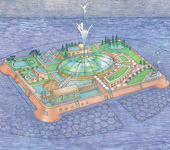 Journalist Hidde Jansen writes: Forget Mars, deserts or kilometer high apartment buildings, in the future we live at sea. If you ask the Dutch pioneers Frits Schoute and Rutger de Graaf, floating cities will be reality within twenty years. Read the full article (in Dutch) at www.oneworld.nl/water/klimaat-toekomst/kunnen-we-wonen-op-zee Click on “read more” for the English translation (more…)
Journalist Hidde Jansen writes: Forget Mars, deserts or kilometer high apartment buildings, in the future we live at sea. If you ask the Dutch pioneers Frits Schoute and Rutger de Graaf, floating cities will be reality within twenty years. Read the full article (in Dutch) at www.oneworld.nl/water/klimaat-toekomst/kunnen-we-wonen-op-zee Click on “read more” for the English translation (more…)
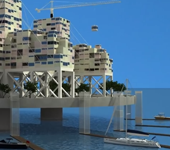 A fresh start on a floating city could be just a few years away, according to the
A fresh start on a floating city could be just a few years away, according to the 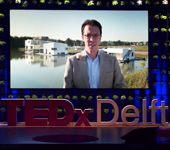 “We are running out of land, so let’s build on the water”. This was the title of a well presented talk on October 4th 2013 at TEDxDelft. Let Rutger de Graaf convince you by some impressive numbers. He presents a big solution (in line with the Ecoboot philosophy) to a big problem.
“We are running out of land, so let’s build on the water”. This was the title of a well presented talk on October 4th 2013 at TEDxDelft. Let Rutger de Graaf convince you by some impressive numbers. He presents a big solution (in line with the Ecoboot philosophy) to a big problem.  Thailand has a long history with living in flood plains, and has many vernacular solutions to protect against flooding. Yet, in recent years Thailand got devastated by floods. This workshop will analyze the traditional measures against flooding, such as floating fishermen villages and stilt homes. Gained insights will be used as a case study for a small village in central Thailand. On urban scale we will study how water communities can connect to the land, on building scale we will analyze floating buildings and on detail scale we’ll try to make a small raft like floating body.
Thailand has a long history with living in flood plains, and has many vernacular solutions to protect against flooding. Yet, in recent years Thailand got devastated by floods. This workshop will analyze the traditional measures against flooding, such as floating fishermen villages and stilt homes. Gained insights will be used as a case study for a small village in central Thailand. On urban scale we will study how water communities can connect to the land, on building scale we will analyze floating buildings and on detail scale we’ll try to make a small raft like floating body.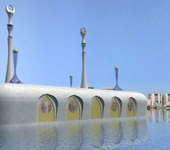 Many spectacular plans do exist for floating buildings. Prof. Chang-Ho Moon of the Kunsan National University in Korea made it more concrete by studying 3 realized and 3 planned projects in terms of sustainability. Below you can download his study which appeared in the Journal of Navigation and Port Research, International Edition.
Many spectacular plans do exist for floating buildings. Prof. Chang-Ho Moon of the Kunsan National University in Korea made it more concrete by studying 3 realized and 3 planned projects in terms of sustainability. Below you can download his study which appeared in the Journal of Navigation and Port Research, International Edition. 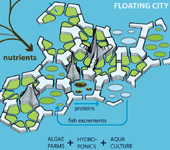 To avoid severe shortages in 2050, existing metropolises must transform into flood proof ecocities. Moreover parts of these cities + food production must be located on the water. These solutions were presented by Ruger de Graaf in his Inaugural Lecture on the Blue Revolution. Below (following read more) you will find a summary + a link to his book presented after this lecture.
To avoid severe shortages in 2050, existing metropolises must transform into flood proof ecocities. Moreover parts of these cities + food production must be located on the water. These solutions were presented by Ruger de Graaf in his Inaugural Lecture on the Blue Revolution. Below (following read more) you will find a summary + a link to his book presented after this lecture. 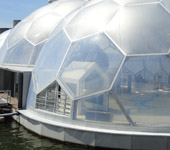 The Exhibition Floating Architecture can now be seen in the Floating Pavilion in the Rijnhaven in Rotterdam. The exhibition moved from the Coolsingel to an appropriate floating building! Fitting very well in the Rotterdam Climate Initiative, plans for floating houses and floating buildings, like schools and greenhouses, are shown.
The Exhibition Floating Architecture can now be seen in the Floating Pavilion in the Rijnhaven in Rotterdam. The exhibition moved from the Coolsingel to an appropriate floating building! Fitting very well in the Rotterdam Climate Initiative, plans for floating houses and floating buildings, like schools and greenhouses, are shown. 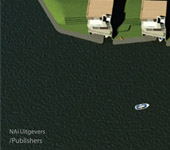 Subtitle: Architecture and Urbanism on the water. A book by Anne Loes Nillesen and Jeroen Singelenberg that outlines the trends and experiments in the realm of architecture on and in close proximity to water.
Subtitle: Architecture and Urbanism on the water. A book by Anne Loes Nillesen and Jeroen Singelenberg that outlines the trends and experiments in the realm of architecture on and in close proximity to water.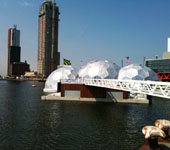 Rotterdam is an ambitious city, especially where it concerns architecture and sustainability. The European cultural capital RUHR.2010 pays tribute to this ambition via 2010LAB.tv by interviewing water architect Bart van Bueren and sustainability alderman Alexandra van Huffelen. Follow the link
Rotterdam is an ambitious city, especially where it concerns architecture and sustainability. The European cultural capital RUHR.2010 pays tribute to this ambition via 2010LAB.tv by interviewing water architect Bart van Bueren and sustainability alderman Alexandra van Huffelen. Follow the link 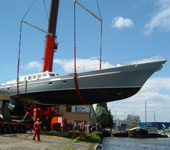 Groningen, Friday July 16, 2010, Wubbo Ockels’ Ecolution touched water for the first time. Whereas Ecoboat (www.ecoboot.nl) is mainly a way of thinking about sustainability, the boat Ecolution actually realizes sustainability. Wind power is literally and figuratively the driving force for sustainability on board. While sailing, the propellers drive their generators (which can also act as motors) to recharge the batteries. One day of sailing stores enough energy for up to 10 days of comfortable living on board. More information on
Groningen, Friday July 16, 2010, Wubbo Ockels’ Ecolution touched water for the first time. Whereas Ecoboat (www.ecoboot.nl) is mainly a way of thinking about sustainability, the boat Ecolution actually realizes sustainability. Wind power is literally and figuratively the driving force for sustainability on board. While sailing, the propellers drive their generators (which can also act as motors) to recharge the batteries. One day of sailing stores enough energy for up to 10 days of comfortable living on board. More information on